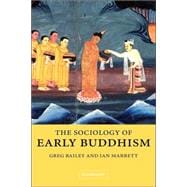
Note: Supplemental materials are not guaranteed with Rental or Used book purchases.
Purchase Benefits
Looking to rent a book? Rent The Sociology of Early Buddhism [ISBN: 9780521831161] for the semester, quarter, and short term or search our site for other textbooks by Greg Bailey , Ian Mabbett. Renting a textbook can save you up to 90% from the cost of buying.
| Introduction | |
| 1. The problem: asceticism and urban life | |
| Part I. Context: 2. The social elite | |
| 3. Economic conditions | |
| 4. Urbanization, urbanism and the development of large-scale political structures | |
| 5. Brahmins and other competitors | |
| 6. Folk religion and cosmology: meeting of two thought worlds | |
| Part II. Mediation: 7. The holy man | |
| 8. Preparation of the monk for the mediatory role: evidence from the Sutta Nipata | |
| 9. The Dhammapada and the images of the Bhikkhu | |
| 10. The mediating role as shown in the canon | |
| 11. Exchange | |
| Conclusion | |
| Bibliography. |
The New copy of this book will include any supplemental materials advertised. Please check the title of the book to determine if it should include any access cards, study guides, lab manuals, CDs, etc.
The Used, Rental and eBook copies of this book are not guaranteed to include any supplemental materials. Typically, only the book itself is included. This is true even if the title states it includes any access cards, study guides, lab manuals, CDs, etc.